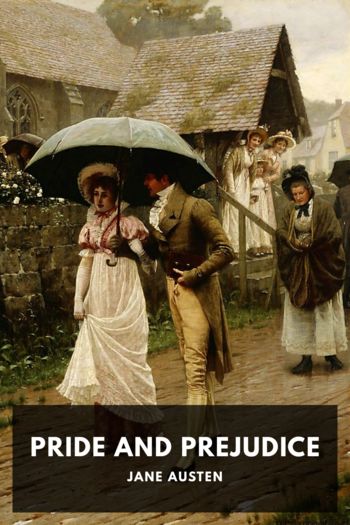Pride and Prejudice, Jane Austen [great novels of all time .TXT] 📗

- Author: Jane Austen
Book online «Pride and Prejudice, Jane Austen [great novels of all time .TXT] 📗». Author Jane Austen
“What think you of this sentence, my dear Lizzy?”—said Jane as she finished it. “Is it not clear enough?—Does it not expressly declare that Caroline neither expects nor wishes me to be her sister; that she is perfectly convinced of her brother’s indifference, and that if she suspects the nature of my feelings for him, she means (most kindly!) to put me on my guard? Can there be any other opinion on the subject?”
“Yes, there can; for mine is totally different. Will you hear it?”
“Most willingly.”
“You shall have it in few words. Miss Bingley sees that her brother is in love with you, and wants him to marry Miss Darcy. She follows him to town in the hope of keeping him there, and tries to persuade you that he does not care about you.”
Jane shook her head.
“Indeed, Jane, you ought to believe me. No one who has ever seen you together, can doubt his affection. Miss Bingley I am sure cannot. She is not such a simpleton. Could she have seen half as much love in Mr. Darcy for herself, she would have ordered her wedding clothes. But the case is this. We are not rich enough, or grand enough for them; and she is the more anxious to get Miss Darcy for her brother, from the notion that when there has been one intermarriage, she may have less trouble in achieving a second; in which there is certainly some ingenuity, and I dare say it would succeed, if Miss de Bourgh were out of the way. But, my dearest Jane, you cannot seriously imagine that because Miss Bingley tells you her brother greatly admires Miss Darcy, he is in the smallest degree less sensible of your merit than when he took leave of you on Tuesday, or that it will be in her power to persuade him that instead of being in love with you, he is very much in love with her friend.”
“If we thought alike of Miss Bingley,” replied Jane, “your representation of all this, might make me quite easy. But I know the foundation is unjust. Caroline is incapable of wilfully deceiving anyone; and all that I can hope in this case is, that she is deceived herself.”
“That is right. You could not have started a more happy idea, since you will not take comfort in mine. Believe her to be deceived by all means. You have now done your duty by her, and must fret no longer.”
“But, my dear sister, can I be happy, even supposing the best, in accepting a man whose sisters and friends are all wishing him to marry elsewhere?”
“You must decide for yourself,” said Elizabeth, “and if upon mature deliberation, you find that the misery of disobliging his two sisters is more than equivalent to the happiness of being his wife, I advise you by all means to refuse him.”
“How can you talk so?”—said Jane faintly smiling—“You must know that though I should be exceedingly grieved at their disapprobation, I could not hesitate.”
“I did not think you would;—and that being the case, I cannot consider your situation with much compassion.”
“But if he returns no more this winter, my choice will never be required. A thousand things may arise in six months!”
The idea of his returning no more Elizabeth treated with the utmost contempt. It appeared to her merely the suggestion of Caroline’s interested wishes, and she could not for a moment suppose that those wishes, however openly or artfully spoken, could influence a young man so totally independent of everyone.
She represented to her sister as forcibly as possible what she felt on the subject, and had soon the pleasure of seeing its happy effect. Jane’s temper was not desponding, and she was gradually led to hope, though the diffidence of affection sometimes overcame the hope, that Bingley would return to Netherfield and answer every wish of her heart.
They agreed that Mrs. Bennet should only hear of the departure of the family, without being alarmed on the score of the gentleman’s conduct; but even this partial communication gave her a great deal of concern, and she bewailed it as exceedingly unlucky that the ladies should happen to go away, just as they were all getting so intimate together. After lamenting it however at some length, she had the consolation of thinking that Mr. Bingley would be soon down again and soon dining at Longbourn, and the conclusion of all was the comfortable declaration that, though he had been invited only to a family dinner, she would take care to have two full courses.
XXIIThe Bennets were engaged to dine with the Lucases, and again during the chief of the day, was Miss Lucas so kind as to listen to Mr. Collins. Elizabeth took an opportunity of thanking her. “It keeps him in good humour,” said she, “and I am more obliged to you than I can express.” Charlotte assured her friend of her satisfaction in being useful, and that it amply repaid her for the little sacrifice of her time. This was very amiable, but Charlotte’s kindness extended farther than Elizabeth had any conception of;—its object was nothing less, than to secure her from any return of Mr. Collins’s addresses, by engaging them towards herself. Such was Miss Lucas’s scheme; and appearances were so favourable that when they parted at night, she would have felt almost sure of success if he had not been to leave Hertfordshire so very soon. But here, she did injustice to the fire and independence





Comments (0)